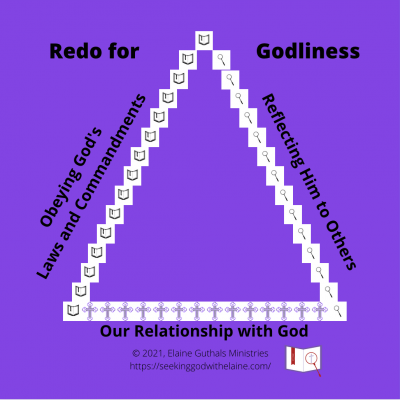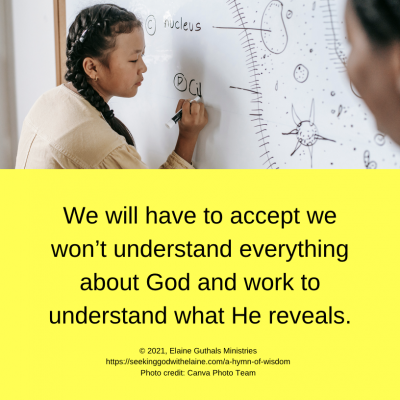
When I started doing the newsletter, I didn’t plan on it taking the place of one of the daily devotions. This is the second month that it has turned out that way.
Thank you. It does put less pressure on me. I needed that today.
Main Nuggets
- The inward has to be in step with the outward when we are transforming into what God wants us. What good — really — is it going to do us to abstain from something but still thinking about it constantly? That really isn’t abstaining.
- Our morality is shown in our motives, not our actions.
- If love is the foundation of our actions, we will choose God’s way to fulfill the laws.

Our Relationship with God
- God calls us to submit to Him (Transformed to Perfection).
- When we do choose to be a living sacrifice, it has to be a daily submission (Transformed to Perfection).
- To be sanctified, it encompasses being, doing, and suffering. We deliberately have to choose to be, to do, and to suffer all that God has in store for us. The three-pronged act of sanctification combines into the perfection of being (Transformed to Perfection).
- If our transformation to perfection was all about what we do, what we might be doing might not necessarily be for God. We might be part of a Save the Kids, Save the Animals, Save the Planet organization that — though they do good work — aren’t working to glorify God, but the worldview. Instead, we are to change our character to be like that of God’s. We are to kick the world’s moralities up to spiritual graces heading toward holiness (Transformed to Perfection).
- But we can’t just be and not do. Because God is in us, the love and joy has to bubble out of us. We can’t keep it to ourselves (Transformed to Perfection).
- Transformation must include our bodies, minds, and souls (Transformed to Perfection).
- God calls us to be different from worldview people (Transformed to Unconformity).
- Transformation is an opening of the mind so that we develop it to change us to possess the character of God (Transformed to Unconformity).
- Being transformed is more than just not sinning. When we are tempted by a sinful situation while interacting with the world, we are called to not commit the sin. But transformation is more than that. We are not called to abstinence alone. What good — really — is it going to do us to abstain from something but still thinking about it constantly. That really isn’t abstaining (Transformed to Unconformity).
- The inward has to be in step with the outward when we are transforming into what God wants us. It isn’t that we don’t do something. It is that we don’t want to do it because we now hate it (Transformed to Unconformity).
- We are to transform into God’s image (Transformed to Unconformity).
- The transformation must be genuine. Head knowledge is not enough. It must transform our hearts. When we present ourselves daily as a living sacrifice, God will reveal Himself to us as we grow and can understand more (Transformed to Unconformity).
- Renewing our minds – in fact, all of us – means changing ourselves to be more like God (Transformed to a New Mind).
- Renewing your mind means changing all of our inner selves – our views and convictions (Transformed to a New Mind).
- Salvation starts the process. Sanctification takes over then (Transformed to a New Mind).
- Our characters aren’t scrapped because we are already made in God’s image. But the problem is we are also made in Adam’s image. So, we need all the sinfulness cut out so all that is left is God’s character in us (Transformed to a New Mind).
- Renewing our minds is a redo of our thoughts. After conversion, disciples are to concentrate on being a new creation. We concentrate on thinking right (Transformed to a New Mind).
- The renewed mind must lead to a transformed life. It is still us and our personality. We transform to be like the Perfect God (Transformed to a New Mind).
- The transformation brought on by renewing our minds should lead to perfection (Transformed to a New Mind).
- Salvation + Regeneration + Sanctification = Perfection (Transformed to a New Mind).
- Perfection is what God wills for us, and it pleases Him when we achieve it. We achieve it by doing good as opposed to evil (Transformed to a New Mind).
- We are transformed into obedient children of God. We humbly want to serve Him (Transformed to a New Mind).
- The whole reason we do the transformation is so that we experience the Will of God. We find out what Romans 8: 28 really means (Transformed to a New Mind).
- This is where, in the midst of a trial, God shows us His nature. He wants us to understand — as much as we can — Who He is (Transformed to a New Mind).
- Because grace and faith are gifts from God, we should be humble (Transformed to Humility through Grace).
- It was God’s choice to extend grace to us (Transformed to Humility through Grace).
- We are not entitled to God’s love and forgiveness. He did not have to design the Plan of Salvation or even offer it to us. God wanted to because He wants to get back to having the hands-on relationship with all of His creation. But we have to accept it (Transformed to Humility through Grace).
- By following God and keeping His laws and commandments, we gain salvation, eternal life, grace and mercy (Transformed to Humility through Grace).
- Sanctification is the process in which the transformation occurs. The process of transforming our nature to be more like God. We complete that process when we seek God (Transformed to Humility through Grace).
- God’s grace helps us transform from pride to humility (Transformed to Humility through Grace).
- We have to control our thoughts and allow God’s call to come through (Transformed to Humility through Grace).
- Part of the think sensibly is the ability for us to evaluate ourselves and our relationship with God (Transformed to Humility through Grace).
- We have to particularly watch when we evaluate ourselves by comparing ourselves to others. We can also make up, magnify, and misrepresent their qualities (Transformed to Humility through Grace).
- While we have to evaluate how far we have come, it is also detrimental to compare ourselves with the old us. If we are growing as we should, the evaluation will highlight areas in which we need to continue our work (Transformed to Humility through Grace).
- We have to watch comparing ourselves to what others think of us (Transformed to Humility through Grace).
- We have to realize we have to evaluate the good and the bad. We can’t just work on the good and ignore the bad. We will always have issues that might become big issues one day (Transformed to Humility through Grace).
- We are given grace and faith. That gives us the credence that we can rely on God to transform us from a prideful person to a humble one (Transformed to Humility through Grace).
- God calls us all to have a part in His ministry (Transformed to Unity).
- We have to focus on God and not ourselves. We sometimes like to think it is about us — who we are and what we want. It isn’t. God’s Church is all about God and what He has done to restore our relationships with Him (Transformed to Unity).
- God has a variety of gifts that He gives to His children (Transformed to Unity).
- When we ABCD, we do get a portion of God’s grace. Ministers are given grace by God to use in His kingdom for others (Transformed to Unity).
- No, we are not all given the same gift — and not all at the same level. We don’t all use our gifts the same way (Transformed to Unity).
- We have an influence in so many different places. Yes, I influence my Ladies when I teach my class. It could be said that I have an influence when I sing on Praise Team and do an offertory on my flute. But I have influence in my own home and job. I can be an influence when I am out shopping. We can be an influence anywhere there is people. It may be in His house, on a mission field — or on our field (Transformed to Unity).
- There has to be harmony of character. We are all to have the same character — God’s.
- Regardless of whatever qualifier we try to put on, all of Christ’s disciples must have the same character — Jesus’. We are called to imitate Him because He is imitating God (Transformed to Unity).
- God’s right place is our #1 priority. We get out of whack when we put this world before God (Transformed to being Servants of God).
- Right doesn’t mean what the world thinks right mean. Right means righteous. Righteous means we are free from sin because we are following God’s moral laws (Transformed to being Servants of God).
- Doing something right is never going to lead to a sin. If the worldview people try to tell us that we have to tolerate sin in order to love them, that is not right (Transformed to being Servants of God).
- There is a lot of room on the continuum from our justification to our perfection after sanctification. Justification is the easy part because it comes once upon ABCDing. Sanctification is the bumpy road (Transformed to being Servants of God).
- No one possesses all of the gifts. For that reason, we have to work together to accomplish God’s mission (Transformed to being Servants of God).
- If we want to serve God — which we should — we should want to serve Him the way He wants us to serve. Oh, yeah. He is going to stretch our comfort zones. He is going to ask us to do some things that have us scratching our heads in wonder. But God knows past, present, and future. He knows the perfected us. He knows our knowledge and abilities even better than we know ourselves (Transformed to being Servants of God).
- God wants disciples to be givers. Yes, it may be money. He also wants our time. He wants our talents. He wants our passions and concerns. He wants all of us. He wants us to do whatever He calls us to do (Transformed to being Servants of God).
- We shouldn’t have ulterior motives or a hidden agenda. We shouldn’t be expecting a specific payoff. In fact, we shouldn’t be expecting anything (Transformed to being Servants of God).
- Love is to be genuine (Transformed to Love).
- Love has to be displayed in our actions. If our words of love differ from our actions, then our words are only manipulation (Transformed to Love).
- The duality of personalities is not that for what God is looking. He is not looking for us to portray ourselves as someone we are not (Transformed to Love).
- God doesn’t want us playing at godliness. He wants us to be godly (Transformed to Love).
- God will not accept just an outward conversion. He is expecting our character to be changed (Transformed to Love).
- Love is expressed by hating evil (Transformed to Love).
- It is our human nature to want to take the “badness” out of sin. We want to, instead, see what sins we can get away with. We want to see how close we can get without sinning. Doesn’t. Work. That. Way (Transformed to Love).
- If we abhor evil, we are disgusted with it. We not only feel a distaste toward the evil, but we are also revolted by it (Transformed to Love).
- God has conquered sin and is teaching how to do the same (Transformed to Love).
- The burden is so great that we cry out in pain because we were disobedient to God. That is, to me, what abhorring evil means (Transformed to Love).
- Love is expressed by doing that which is good (Transformed to Love).
- When we cut something out of our lives, it is important to have something ready to fill that space. We should replace the evil with good (Transformed to Love).
- An exhibit of our conversion is our love. “If we love our brothers and sisters who are believers, it proves that we have passed from death to life. But a person who has no love is still dead” (I Jn. 3: 14 NLT). But look who it says are the objects of our love — fellow disciples. Not sinners. Believers.
- It is important that we perform worldly activities with a spiritual motive. Our morality is shown in our motives, not our actions (Transformed by Persistence).
- We don’t have to do anything for salvation except accept the gift. However, sanctification has aspects of being, doing, and suffering. The being is believing in the doctrines (Transformed by Persistence).
- In our passionate service for God, we need to keep the intensity up for the work God has called us to do (Transformed by Persistence).
- Our joy from being transformed as well as the the evidence of these changes must bubble out from us. Others have to see the changes that are occurring in us (Transformed by Persistence).
- God wants us to completely submit to Him. That means all of the virtues that we possess must be up to His level (Transformed by Persistence).
- In our passionate service for God, we need to be completely committed to doing the work to which He has called us (Transformed by Persistence).
- We have to work in the service project that God has designated. We can’t go off and do our own thing, and expect God to sanction our work (Transformed by Persistence).
- Religion — a.k.a. our relationship with God — is a gift that we can either accept or reject. What is hard about that? Well, for some people, it can be a hard decision. Also, serving God has its difficulties as well. He described it as a pitched battle with the enemy between us and our reward. It is difficult, but not impossible (Transformed by Persistence).
- Our persistent application of moral virtues to our lives is the foundation of virtue and morality. Hmmmm. Kind of sounds like a circular definition, doesn’t it? But then again, I see it. The application of His moral virtues is the foundation of making our virtues and morality what He wants them to be (Transformed by Persistence).
- Even in the trials, we can have joy because we have hope (Transformed through Trials).
- When we hope, we are believing not only can something good happen, but it can also happen to us. We don’t try to make excuses that we aren’t worthy enough. We are worthy because we have accepted Jesus’ blood as a cover for our sins (Transformed through Trials).
- Hope can only really come from moral goodness. That moral goodness comes from God (Transformed through Trials).
- This joyous hope has an element of patience in all circumstances. When trials are surrounding us, this hope helps us to not give up. It gives us patience to keep our eyes focused on God through it all (Transformed through Trials).
- We show that focus by continuing to praise God — even in the worst of times (Transformed through Trials).
- But bottom line, each trial is asking the same questions. Are we going to remain strong in our faith, or are we going to deny God? Are we going to live by God’s laws and commandments or break them? (Transformed through Trials)
- We should always pray to our Heavenly Father — especially when we are going through trials (Transformed through Trials).
- God doesn’t have to accept our prayers. I think we sometimes keep the focus on He is a loving and forgiving God, so that we gloss over what isn’t right about our prayers. That means we can’t approach God with an attitude of entitlement. He doesn’t have to answer prayers that really aren’t prayers at all. If we go with the attitude of entitlement, it really isn’t a two-way communication with God. It is us demanding what we want regardless. When we pray to the Sovereign God, we must pray in meekness, worship, and submission (Transformed through Trials).
- Praying with persistence means we aren’t done when we’ve finished the prayer. We need to meditate and do what God calls us to do to accomplish it (Transformed through Trials).
- While we are in these physical bodies, we are not going to be able to “sin no more.” God isn’t going to judge us on something that there is no way for us to have success (Transformed through Trials).
- Prayer gives us strength. We get that by ensuring our prayers have the components of faith, trust, hope, and love (Transformed through Trials).
- While we are going through the trials, we can have joy and hope. Communicating with God through prayer brings us that (Transformed through Trials).
- Emotions help us build the relationship with God. They also help us to become invested in the lives of those to whom we are witnessing (Transformed to Harmony).
- God wants to order and organize our lives so that we have the peace needed to worship Him. If we don’t have the peace governments are to provide for us, we won’t have the comfort to worship. That gives governments a divine purpose (Submitting to Authority).
- God wants us to be good managers of our resources (Submitting to Love).
Glossary

Obeying God’s Laws and Commandments
- Disciples should not fear government leaders if they are following God’s laws and commandments (Submitting to Authority).
- In my opinion, submitting means committing to live a sin-free life (Submitting to Love).
- The worldview tries to insinuate that something they believe is right is because many people believe that. That is not true. God gives us laws and commandments to show us what is right and what is wrong. They stress that instead of following God, we should not do anything that would offend someone else (Transformed to Unconformity).
- If we lower God’s standards to be more like the world, we are doing a disservice to non-believers. God will judge them on His standards, not the world’s or some combination thereof (Transformed to Unconformity).
- Worldview people focus on the negative — the submission, the don’ts (Transformed to Unconformity).
- Sometimes, we want the do’s and don’ts of the laws and commandments to be a checklist. Have we gotten it right, or did we go off the rails somewhere? But God isn’t about checklists. He is about character. Checklists might not serve us in every situation. Character does (Transformed to Unity).
- Satan wants us to think one of God’s laws and commandments cancels out another. That isn’t what God says. God said do all. Not pick and choose. Not place one law above the other. God said to obey all the laws (Transformed to being Servants of God).
- Serving the Lord means that we are completely committed to His laws and commandments. It is our intent that He be glorified (Transformed by Persistence).

Reflecting Him to Others
- By being in constant communication with Him, we are devoted to God and serve Him and others (Transformed to Perfection).
- God calls us to serve Him by loving and encouraging others (Transformed to Service and Worship).
- Whatever way God chooses for us to serve Him must be holy (Transformed to Service and Worship).
- Reasonable service should be equated with intentional. We need to choose to follow God with every fiber of our being (Transformed to Service and Worship).
- Love is a distinguishing mark of our being disciples (Are Disciples to Ignore Sin Because of Love?).
- Love does have to be part of our character (Are Disciples to Ignore Sin Because of Love?).
- God doesn’t say only submit to good leaders. He doesn’t qualify that we have to believe what the leader’s agenda is in order to submit. He doesn’t limit it by ethnicity, race, or religious affiliation. In other words, God doesn’t give His people — or any of His creation — a pass from submitting to leaders (Submitting to Authority).
- Witnessing is about building relationships. That takes time (The Expected Message).
- We can’t choose to sin because the worldview people think that is what “love your neighbor” means (Transformed to Unity).
- We all have a story. It shows how God loves us and provides for us. We are to use them to witness to others (Transformed to being Servants of God).
- Worldview people think they are merciful — sometimes even more so than disciples. They can have compassion for others. The problem is they are not performing the acts to glorify God or to expand His kingdom. That is why disciples are to be merciful. We are to show others that God loves us.
- We are also to be burdened with the sins of others. We are given our marching orders to help them see the need to confess their sins (Transformed to Love).
- We have to make sure we are doing the hate right. It says hate sin. It does not say hate the sinner (Transformed to Love).
- Love is expressed by considering others family (Transformed to Love).
- Our love stems from God. It doesn’t come from us. It definitely doesn’t come from this world (Transformed to Love).
- The first take away is we are all the same. Regardless of our race and ethnicity, we are all children of Adam. We are one big family (Transformed to Love).
- God wants us to love all. That is because we are showing all that He loves them (Transformed to Love).
- Love is expressed by holding others in high esteem (Transformed to Love).
- Disciples are to love one another, especially our brothers and sisters in Christ, so that we can support them in their needs (Transformed to Harmony).
- Trying to persecute our enemies on our own will lead to harm. We’ve got to follow God’s Will, not our own (Transformed to Harmony).
- God wants us to be unified with others (Transformed to Harmony).
- We are to rejoice with others in their joy and encourage them in their hardships (Transformed to Harmony).
- We need to support and encourage others. In this way, we show them God (Transformed to Harmony).
- When we meet others where they are at and address what they are at the time, we build connections. These connections are built into relationships so that we can witness the love of God to others (Transformed to Harmony).
- We have to make it about other people so that we build opportunities to witness to them (Transformed to Harmony).
- Living in harmony with others allows for God’s love to shine through (Transformed to Harmony).
- Having pride isn’t the way to go. God calls us to be humble (Transformed to Harmony).
- God wants us to be humble and submissive to Him. The submissive part means that we don’t sin and give Him the glory He deserves (Transformed to Harmony).
- One thing Paul is saying here is we can’t think more highly of ourselves than we are. We have to acknowledge that, without a relationship with God, we are nothing (Transformed to Harmony).
- It is easy to love people when they are lovable — i.e. fit into our expectations and beliefs. We need to love the hard to love people anyway (Transformed to Harmony).

To read devotions in the Redo for Godliness series, click the appropriate button below.